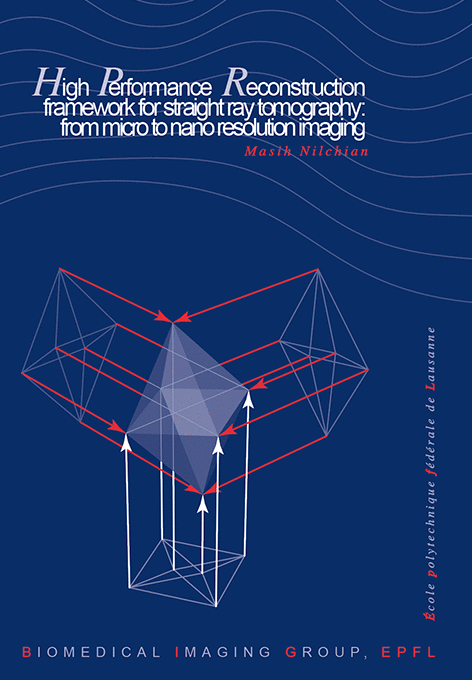High Performance Reconstruction Framework for Straight Ray Tomography: From Micro to Nano Resolution Imaging
M. Nilchian
SSBE research award, École polytechnique fédérale de Lausanne, EPFL Thesis no. 6621 (2015), 221 p., May 11, 2015.
We develop a high-performance scheme to reconstruct straight-ray tomographic scans. We preserve the quality of the state-of-the-art schemes typically found in traditional computed tomography but reduce the computational cost substantially. Our approach is based on 1) a rigorous discretization of the forward model using a generalized sampling scheme; 2) a variational formulation of the reconstruction problem; and 3) iterative reconstruction algorithms that use the alternating-direction method of multipliers. To improve the quality of the reconstruction, we take advantage of total-variation regularization and its higher-order variants. In addition, the prior information on the support and the positivity of the refractive index are both considered, which yields significant improvements.
The two challenging applications to which we apply the methods of our framework are grating-based x-ray imaging (GI) and single-particle analysis (SPA). In the context of micro-resolution GI, three complementary characteristics are measured: the conventional absorption contrast, the differential phase contrast, and the small-angle scattering contrast. While these three measurements provide powerful insights on biological samples, up to now they were calling for a large-dose deposition which potentially was harming the specimens (e.g., in small-rodent scanners). As it turns out, we are able to preserve the image quality of filtered back-projection-type methods despite the fewer acquisition angles and the lower signal-to-noise ratio implied by a reduction in the total dose of in-vivo grating interferometry. To achieve this, we first apply our reconstruction framework to differential phase-contrast imaging (DPCI). We then add Jacobian-type regularization to simultaneously reconstruct phase and absorption. The experimental results confirm the power of our method. This is a crucial step toward the deployment of DPCI in medicine and biology. Our algorithms have been implemented in the TOMCAT laboratory of the Paul Scherrer Institute.
In the context of near-atomic-resolution SPA, we need to cope with hundreds or thousands of noisy projections of macromolecules onto different micrographs. Moreover, each projection has an unknown orientation and is blurred by some space-dependent point-spread function of the microscope. Consequently, the determination of the structure of a macromolecule involves not only a reconstruction task, but also the deconvolution of each projection image. We formulate this problem as a constrained regularized reconstruction. We are able to directly include the contrast transfer function in the system matrix without any extra computational cost. The experimental results suggest that our approach brings a significant improvement in the quality of the reconstruction. Our framework also provides an important step toward the application of SPA for the de novo generation of macromolecular models. The corresponding algorithms have been implemented in Xmipp.

@PHDTHESIS(http://bigwww.epfl.ch/publications/nilchian1502.html,
AUTHOR="Nilchian, M.",
TITLE="High Performance Reconstruction Framework for Straight Ray
Tomography: {F}rom Micro to Nano Resolution Imaging",
SCHOOL="{\'{E}}cole polytechnique f{\'{e}}d{\'{e}}rale de {L}ausanne
({EPFL})",
YEAR="2015",
type="{EPFL} Thesis no.\ 6621 (2015), 221 p.",
address="",
month="May 11,",
note="{SSBE} research award")